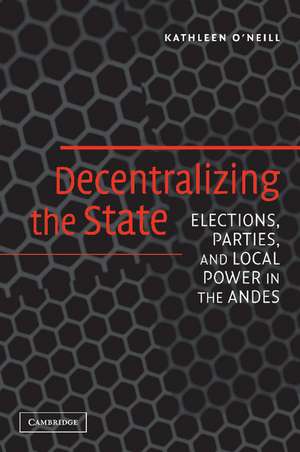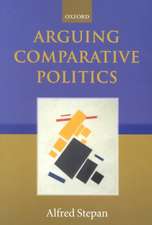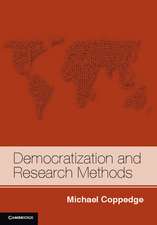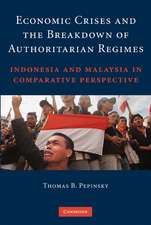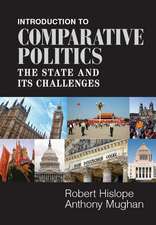Decentralizing the State: Elections, Parties, and Local Power in the Andes
Autor Kathleen O'Neillen Limba Engleză Paperback – 5 iun 2005
| Toate formatele și edițiile | Preț | Express |
|---|---|---|
| Paperback (1) | 210.33 lei 6-8 săpt. | |
| Cambridge University Press – 5 iun 2005 | 210.33 lei 6-8 săpt. | |
| Hardback (1) | 569.64 lei 6-8 săpt. | |
| Cambridge University Press – 5 iun 2005 | 569.64 lei 6-8 săpt. |
Preț: 210.33 lei
Nou
Puncte Express: 315
Preț estimativ în valută:
40.25€ • 41.87$ • 33.23£
40.25€ • 41.87$ • 33.23£
Carte tipărită la comandă
Livrare economică 14-28 aprilie
Preluare comenzi: 021 569.72.76
Specificații
ISBN-13: 9780521609708
ISBN-10: 0521609704
Pagini: 286
Ilustrații: 7 b/w illus. 37 tables
Dimensiuni: 152 x 229 x 16 mm
Greutate: 0.38 kg
Ediția:New.
Editura: Cambridge University Press
Colecția Cambridge University Press
Locul publicării:New York, United States
ISBN-10: 0521609704
Pagini: 286
Ilustrații: 7 b/w illus. 37 tables
Dimensiuni: 152 x 229 x 16 mm
Greutate: 0.38 kg
Ediția:New.
Editura: Cambridge University Press
Colecția Cambridge University Press
Locul publicării:New York, United States
Cuprins
Part I. Electoral Theory and Comparative Evidence: 1. Introduction; 2. A political theory of decentralization; 3. Decentralization in comparative perspective; Part II. In-Depth Country Studies: 4. The Colombian experience; 5. The Bolivian experience; 6. Ecuador, Peru, and Venezuela; Part III. Comparisons, Conclusions, and Extensions: 7. Comparisons, conclusions, and extensions; 8. Afterword.
Recenzii
"O'Neill takes on a fundamental puzzles in comparative politics -- Why would national-level politicians decentralize power to subnational governments? She finds theories based on economic efficiency and crisis, external pressure from international actors, and internal ethnic heterogeneity lacking, proposes an alternative, electoral theory of decentralization, and tests it against five cases from the Andean region. The research strategy is elegant and clearly stated, and the results are impressive. This is a terrific contribution to our understanding of decentralization."
John Carey, Dartmouth College
"Why would a central government give up some of its power by promoting decentralizing reforms that shift decision-making and resources to the subnational level? In this excellent book, Kathleen O'Neill examines this important question, focusing on five Andean countries (Bolivia, Chile, Ecuador, Peru, and Venezuela). She develops an original and compelling argument that presidents will promote decentralization if their parties are skeptical they will win the next presidential election but are well poised to win executive power in some subnational districts. The research, analysis, and writing are outstanding."
Scott Mainwaring, University of Notre Dame
"Decentralizing the State explores the dynamics of decentralization in an innovative fashion. It starts from several intellectual puzzles, noting that countries do not decentralize because of international technocratic pressure to 14improve governance12 or because decentralization supposedly follows from democratization. Instead, OaNeill argues that decentralization is a function of the dynamics of domestic party politics - in particular of politiciansa electoral strategies to ensure their future political survival. The argument is powerful and the evidence is strong, and the book should serve as an important source for scholars and policy practitioners alike."
David Samuels, University of Minnesota
"This original argument, its solid grounding in qualitative and quantitative analyses, and its testing and refinement through case studies of all five of the increasingly troubled Andean countries, make this volume a major contribution to our understanding of important features of contemporary politics. It is an essential primer for politicians and policymakers seeking to understand the intersection of electoral politics and institutional design."
Donna Lee Van Cott, Tulane University
O'Neill presents a wealth of masterfully compiled information on the five cases, and by combining different research strategies (formal modelling and statistical analysis with in-depth qualitative case studies) she provides a convincing example of the merits of methodological pluralism."
Ana Maria Bejarno, University of Toronto, CJLACS/RCELAC
“O’Neill’s carefully constructed work sets a useful baseline for others who might be interested in exploring how electoral incentives intersect with other factors that determine why and when decentralization occurs.” - Daniel Ziblatt, Harvard University
John Carey, Dartmouth College
"Why would a central government give up some of its power by promoting decentralizing reforms that shift decision-making and resources to the subnational level? In this excellent book, Kathleen O'Neill examines this important question, focusing on five Andean countries (Bolivia, Chile, Ecuador, Peru, and Venezuela). She develops an original and compelling argument that presidents will promote decentralization if their parties are skeptical they will win the next presidential election but are well poised to win executive power in some subnational districts. The research, analysis, and writing are outstanding."
Scott Mainwaring, University of Notre Dame
"Decentralizing the State explores the dynamics of decentralization in an innovative fashion. It starts from several intellectual puzzles, noting that countries do not decentralize because of international technocratic pressure to 14improve governance12 or because decentralization supposedly follows from democratization. Instead, OaNeill argues that decentralization is a function of the dynamics of domestic party politics - in particular of politiciansa electoral strategies to ensure their future political survival. The argument is powerful and the evidence is strong, and the book should serve as an important source for scholars and policy practitioners alike."
David Samuels, University of Minnesota
"This original argument, its solid grounding in qualitative and quantitative analyses, and its testing and refinement through case studies of all five of the increasingly troubled Andean countries, make this volume a major contribution to our understanding of important features of contemporary politics. It is an essential primer for politicians and policymakers seeking to understand the intersection of electoral politics and institutional design."
Donna Lee Van Cott, Tulane University
O'Neill presents a wealth of masterfully compiled information on the five cases, and by combining different research strategies (formal modelling and statistical analysis with in-depth qualitative case studies) she provides a convincing example of the merits of methodological pluralism."
Ana Maria Bejarno, University of Toronto, CJLACS/RCELAC
“O’Neill’s carefully constructed work sets a useful baseline for others who might be interested in exploring how electoral incentives intersect with other factors that determine why and when decentralization occurs.” - Daniel Ziblatt, Harvard University
Descriere
This book, first published in 2005, explores decentralizing reforms in Bolivia, Columbia, Ecuador, Peru, and Venezuela.
